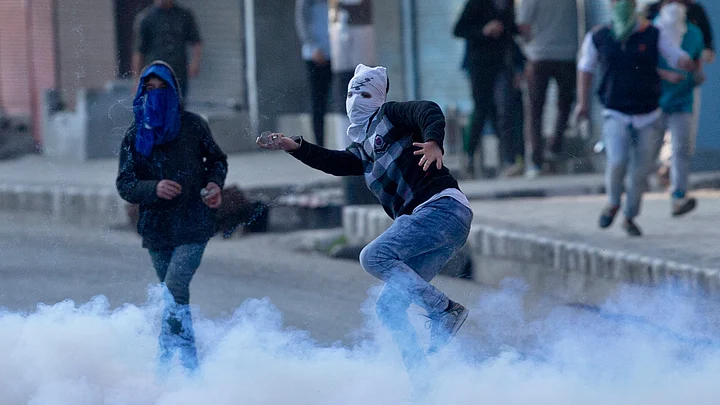The recent Hizbul Mujahideen statement rejecting nationalism and focusing only on religion-based mobilisation gives a glimpse of the age. The idea that a singular, fundamentalist religious identity is not only of prime importance, but is the only significant one, is gaining ground in many parts of the world.
In Kashmir, a significant proportion of young people, particularly teenagers, have bought into the idea in recent years.
The polarisation and fear psychosis generated by the rise of the BJP has given it salience. Anger among Kashmiri teenagers after beef vigilantes burnt a teenaged truck cleaner alive near Udhampur in 2015 led many of them to reject the system entirely, and turn to alternatives.
In this light, governance and justice based on ‘pure’ religion seems attractive.
Burhan Wani’s Successor
The recent video speech of Hizb commander Zakir Bhat aka Musa (who succeeded Burhan Wani as Hizb’s commander in south Kashmir) reflected a rising tide in the thinking of Kashmiris younger than he is (Musa is 22 years old).
In the video, he urged young people to understand whenever they picked up stones or guns that they were doing it in order that Islam could dominate, and not for nationalism.
He also rejected democracy as a worthwhile ideal. His video implicitly adopted many of the ideas and objectives of ISIS – although his organisation is not overtly linked to it.
Sharp Contrast
This sort of current thinking presents a sharp contrast to the global influences that shaped Kashmir’s political mobilisation in the 1930s. Muslim identity was the dominant current during the uprising of 1931, which swept Sheikh Abdullah to iconic stature in Kashmir.
At the height of that uprising, the then Mirwaiz, Maulvi Yousuf Shah, was reported to have called for a jihad. People from various corners of the Valley immediately emerged with axes, knives and whatever other potential weapons they had in their homes.
Quite soon, however, the globally dominant political thinking of that Shavian age reshaped Kashmir’s political mobilisation. By 1934, Communist ideas of egalitarianism and secularism shaped the movement’s rhetoric.
Tension Between Identities
The tension between religious and ethnic identities continued, however – even if it was subliminal. Although Abdullah pointed out in public speeches that there were poor Pandits, as well as Muslim landlords, many common Kashmiris perceived their situation as a class war between impoverished Muslims and dominant Hindus (Pandits and Dogras).
When Abdullah strained to try and turn autonomy into independence in 1952-53, he deployed religious identity again.
Addressing a public meeting at Ranbirsingpora not far from Jammu in April 1953, he said he was fearful of the fate of Muslims in India after Nehru would be gone.
He is also reported to have said that he had committed a crime against the Quran by backing the state’s accession to India.
Islamism of the ’80s
When Kashmiri nationalism grew strong again in the 1980s, global winds were at play once more. Iran’s Islamic revolution, the Soviet invasion of Afghanistan, the US-backed `jihad’ campaign against it, and Zia-ul Haq’s Islamist agenda in Pakistan (all of which emerged at the end of the 1970s) generated a surge in Islamism.
The perception of a class war based on religious identity too was in play again. As in the 1920s and ’30s, educated Muslims felt that Pandits got the lion’s share of government jobs, thus dashing Muslim aspirations.
JKLF Ambivalence
Unlike JKLF founders such as Maqbool Butt, who were committed to secular, socialist, liberal ideas, Valley-based freedom fighters such as Azam Inquilabi were inspired by the 19th century pan-Islamist activist, Jamaluddin Afghani, and by violent Islamist resistance to the British in the northwest frontier in the late 19th century.
When they became commanders of the JKLF in 1989, Ishfaq Majid and Yasin Malik were as old as Zakir Musa now is. As schoolboys in the mid-80s, they were shaped by the Islamic Students League, which was led by an Ahle-Hadith preacher.
The boys’ teenaged assertion of identity included breaking crockery and bending cutlery at a Hindu-owned eatery in uptown Srinagar.
New Trend
Such pranks were at best not thought out. Like the movement of 1931, and Abdullah’s 1953 rhetoric, they ambivalently conflated religious and ethnic identity. They never rejected ethnic nationalism the way Musa and many contemporary teenagers now have.
Most of the early Hizbul Mujahideen fighters were committed to Pakistani rather than Kashmiri nationalism. Many of them rejected liberal values, and were doubtful about democracy.
However, the total rejection of the concept of nationalism in Musa’s video publicly acknowledges a current trend that cannot be wished away.
(The writer is a Kashmir-based author and journalist. He can be reached at @david_devadas)
Join The Quint on WhatsApp. Type “JOIN” and send to 9910181818
